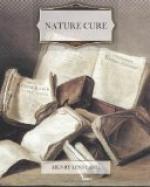Applied to the physical activity of the body, the Law of Com-pensation may be expressed as follows: “Every agent affecting the human organism produces two effects: a first, apparent, temporary effect, and a second, lasting effect. The secondary, lasting effect is always contrary to the primary, transient effect.”
For instance: The first and temporary effect of cold water applied to the skin consists in sending the blood to the interior; but in order to compensate for the local depletion, Nature responds by sending greater quantities of blood back to the surface, resulting in increased warmth and better surface circulation.
The first effect of a hot bath is to draw the blood to the surface; but the secondary effect sends the blood back to the interior, leaving the surface bloodless and chilled.
Stimulants, as we shall see later on, produce their deceptive effects by burning up the reserve stores of vital energy in the organism. This is inevitably followed by weakness and exhaustion in exact proportion to the previous excitation.
The primary effect of relaxation and sleep is weakness, numbness and death-like stupor; the secondary effect, however, is an increase of vitality.
The Law of Dual Effect governs all drug action. The first, temporary, violent effect of poisonous drugs, when given in physiological doses, is usually due to Nature’s efforts to overcome and eliminate these substances. The secondary, lasting effect is due to the retention of the drug poisons in the system and their action on the organism.
In theory and practice, allopathy considers the first effect only and ignores the lasting aftereffects of drugs and surgical operations. It administers remedies whose first effect is contrary to the disease condition. Therefore, in accordance with the Law of Action and Reaction, the secondary, lasting effect of such remedies must be similar to or like the disease condition.
Common, everyday experience should teach us that this is so, for laxatives and cathartics always tend to produce chronic constipation.
The secondary effect of stimulants and tonics of any kind is increased weakness, and their continued use often results in complete exhaustion and paralysis of mental and physical powers.
Headache powders, pain killers, opiates, sedatives and hypnotics may paralyze brain and nerves into temporary insensibility; but, if due to constitutional causes, the pain, nervousness and insomnia will always return with redoubled force. If taken habitually, these agents invariably tend to create heart disease and paralysis, and ultimately develop the patient into a dope fiend.
Cold and catarrh cures (?), such as quinine, coal-tar products, etc., suppress Nature’s efforts to eliminate waste and morbid matter through the mucous linings of the respiratory tract, and drive the disease matter back into the lungs, thus breeding pneumonia, chronic catarrhs, asthma and consumption.




